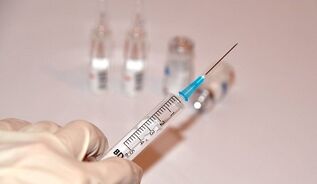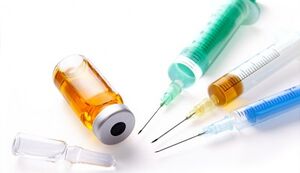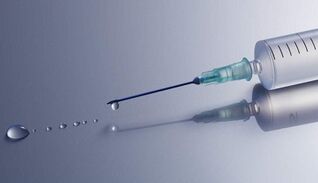
Prostatitis injections are the most effective dosage form. Injections act on the lesion much faster than tablets or suppositories. But treatment with prostatitis injections is prescribed for special indications and also has a number of contraindications.
Advantages and disadvantages of prostatitis injections
To find out what is better for suppositories, pills or injections for prostatitis, you need to consider the benefits of injections:
- Execution.The active substances enter the bloodstream immediately, reaching the focus of inflammation within 5-10 minutes. It takes longer to dissolve tablets and suppositories. The pills work for a particularly long time, as they must first pass through the digestive tract, be absorbed into the blood.
- Ability to use the exact dose.During the injection treatment, all the necessary concentration of the drug enters the blood. When using tablets, a certain part of the active substances is destroyed under the influence of gastric enzymes.
- Easy to implement.Injections can be given regardless of the patient's condition. For example, when the patient is tormented by vomiting and he cannot take pills.
Disadvantages of the injection:
- The need for the help of a medical professional.
- Problem, soreness of the procedure.
- Risk of infection at the puncture site.
- The likelihood of developing adverse effects from improper injection, such as redness, inflammation or purulent process.
Thus, the use of injections to exacerbate prostatitis is much more effective than other dosage forms, but is inconvenient for self-medication.
When injections are prescribed for inflammation of the prostate
Prostatitis injections in men are mainly used in acute pathology. It is accompanied by severe symptoms, such as severe pain, difficulty urinating. Such manifestations significantly reduce the quality of life of the patient and therefore require immediate elimination.
In addition to the acute type of inflammation of the prostate, injections may be prescribed for:
- chronic form of prostatitis, if of bacterial origin;
- blood stasis in the small pelvis;
- severe erectile dysfunction;
- infertility;
- circulatory disorders in the groin area;
- Infectious lesions of organs adjacent to the prostate gland.
Injections are often given after surgery in the urinary system.
What injections are given for prostatitis
Prostatitis injections are prescribed differently, depending on the cause of the disease, the existing symptoms. The treating physician must select groups of drugs; self-medication with injections is strictly forbidden to avoid worsening of the disease.
Antibiotics

Antibacterial injections are designed to fight pathogenic microorganisms that provoke the development of an inflammatory process in the prostate. By killing the bacteria, the drugs help to repair the affected tissues of the prostate gland.
It is important to understand that antibiotic treatment should be done strictly in courses. Even if the patient feels better, all symptoms have disappeared, the number of prescribed injections still needs to be completed. Otherwise, therapy will be considered incomplete, the pathology will return and it is more likely to become chronic.
Painkillers
Injections for prostatitis pain in men are usually prescribed for an acute form of pathology, as it is accompanied by severe pain. Such injections are resorted to if the syndrome is so severe that the patient cannot fully go to the toilet and even sit or move.
Such drugs eliminate the pain syndrome, normalize the condition of prostate tissues, relieve spasms. But their long-term use is not allowed. The average period of therapy is 1-3 days.
Immunomodulators
Immunomodulators are designed to support the functioning of the immune system. They are used more often in the chronic form of prostatitis, if the body is no longer able to fight pathogenic microorganisms on its own.
It should be noted that doctors are still debating whether the use of immunomodulators is justified. It is believed that the effect of such drugs on the body is unpredictable. Ideally, the treating physician should perform immunological tests before prescribing them.
Anti-inflammatory
Prostatitis is an inflammatory process in the prostate gland. It should be the main effect during treatment. Therefore, anti-inflammatory drugs are the main components of therapy.
Doctors prefer such injections for chronic and acute prostatitis as diclofenac and ibuprofen. They are able to quickly relieve inflammation, as well as eliminate pain and fever.
Decongestants
When inflammation occurs, the prostate tissue swells. Decongestant injections can normalize their condition. Their active ingredient is testicular hyaluronidase, derived from the testes of cattle.
Medications soften connective tissue, improve blood flow, relieve prostate swelling and prevent scarring. The therapeutic course is 10 days, one injection daily.
Hot injections

The use of hot injections to treat prostatitis in men involves the introduction of a special drug into the blood. This name is given to the injections because after them the patient feels a strong influx of heat in the body. The substance helps to relieve inflammation, eliminate the symptoms of the disease.
It should be noted that skin contact may cause tissue damage. The dosage is determined by your doctor. If not observed, nausea, a sharp drop in blood pressure and loss of consciousness may occur.
Aloe injections
Cheap and effective injections for prostatitis include aloe injections, which help achieve the following result:
- improve blood circulation in the pelvis, reduce blood viscosity, which eliminates congestion, normalizes the nutrition of prostate tissue;
- for the destruction of pathogenic microorganisms that cause inflammation in the prostate. Therefore, injections are often given in conjunction with antibiotic therapy to enhance the effect of antibiotics;
- get rid of the inflammation in the affected organ;
- strengthen the immune system, which accelerates the recovery of men.
Aloe injections are prescribed at a dose of 1 ml per day. The duration of treatment is one month. If necessary, a second course is held after a 2-week break. In chronic inflammation of the prostate it is recommended to undergo 3-4 months of therapy.
Contraindications to injections
Even the best injections for prostatitis have a certain list of contraindications, depending on the active ingredient. Common prohibitions on all injections include atrophy of muscle tissue, damage to the skin and subcutaneous fat at the puncture site. If the contraindications are not taken into account, there is a risk of developing various diseases or their exacerbation, as well as an allergic reaction.
In this way, injections in the treatment of prostatitis are given in an acute form, when it is necessary to quickly eliminate the pronounced symptoms of the disease. In other cases, rectal suppositories and tablets are used.
























